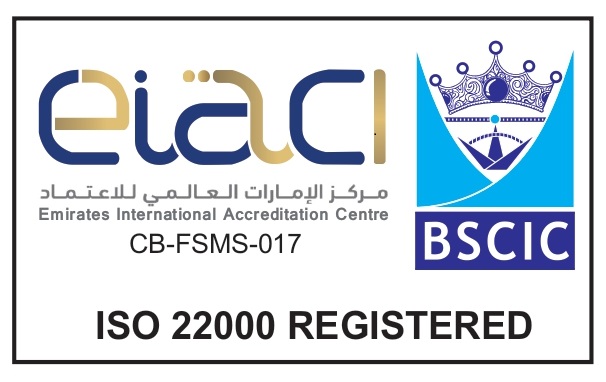This ISO Management System will be accredited by EIAC
(Emirates International Accreditation Center)
 What do you mean by ISO 22000?
What do you mean by ISO 22000?
A food safety management system is also a word that applies to ISO 22000. It consists of procedures that FBOs must adhere to in order to create food that is safe for consumption, such as GMP, GHP, HACCP, etc. Food safety is made possible by a set of established policies and goals.
Businesses can utilise ISO 22000 to assist them lower food hazards and perform better in terms of food safety.
This International Standard aims to address only issues related to food safety. However, because of its technique, it can be used to plan and address other food-related concerns (such as moral dilemmas and consumer awareness). Even while ISO 22000, unlike ISO 9001, is a procedurally focused standard as opposed to a principle-based one, they both share the quality management system.
Importance or need of ISO 22000?
Food consumption must be risk-free and safe per standard requirements. In the food industry, food safety and cleanliness are now considered to be the most important standards. The ISO 22000 standard includes the FSMS requirement and provides a set of processes to FBOs who must demonstrate their capacity to create food free of hazards and guarantee food safety throughout the food chain.
It accomplishes this by giving them a framework for creating a food safety management system (FSMS), which is a methodical way to handle food safety problems.

Advantages/Benefits of an FSMS
-
The following are some of the advantages of FSMS:
- It guarantees that the food is safe to eat at the time of consumption.
- It lowers the risk of foodborne illness.
- It contributes to FBOs' economic progress.
- There is less product loss.
- Better cooperation and communication with regulators in the industry.
- Enhancements to inventory control
- Increased employee food safety awareness and participation
- Increased product quality and consistency in preparation
Is it complex to implement to ISO 22000?
It offers a framework that FBOs may use to create a food safety management system (FSMS), which is a methodical method of addressing food safety problems.
To ensure that food is safe across the entire food chain, there are numerous actions that must be taken at the moment ISO 22000 is implemented.

The ISO 22000 certification process must take into account the following essential factors:
- Review of the application and the contract
- Initial Audit Certification: Stages 1 and 2 of the Audit
- Certification decision
- Audit of surveillance
- Audit of renewal
- Suspending, revoking, extending, and/or reducing certification scope
Migration from ISO 22000:2005 to ISO 22000:2018
The International Accreditation Forum (IAF) established a three-year transition period from publication to entry into force for the new ISO 22000:2018 standard, which was released on June 18, 2018. The phase-out of ISO 22000:2005 will begin with this release. The transition arrangements and associated deadlines have been extended by 6 months as a result of Covid-19 and the IAF dispositions, and the transition end date has been modified from 29 June 2021 to 29 December 2021.
MIGRATION OF CERTIFICATIONS ACCREDITED BY ISO 22000:2005 TO 22000:2018.
RENEWALS AND NEW CERTIFICATIONS
New certifications and renewals for both editions of ISO 22000:2005 and ISO 22000:2018 will be given for up to three years after the publication of the new ISO 22000:2018.
All existing ISO 22000:2005 certifications will expire three years after the introduction and publishing of ISO 22000:2018 (19th June 2018), with the transition date set for December 31, 2021.Key changes in ISO 22000:2018
Here are a few major changes to think about:
Changes because of HLS adoption
- Business context and stakeholders
- Greater emphasis on leadership and management commitment:
- Risk management
- A sharper focus on goals as motivators for growth
- More stringent communications requirements
- Less stringent standards for a food safety handbook
Additional changes unique to ISO 22000 and food safety management
- The PDCA cycle
- The scope has been expanded to include animal feeds
- There have been some significant revisions to the definitions
- Disseminating information about the food safety policy.
- Goals of the Food Safety Management System:
- Oversight of processes, products, or services provided by third parties
